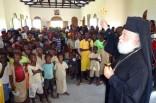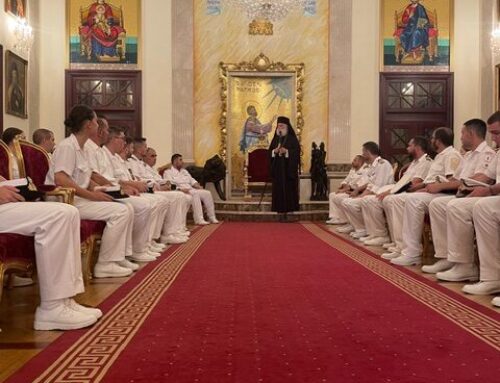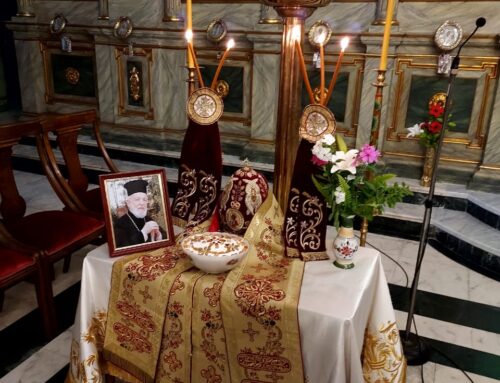On 10th March 2013, an article by His Beatitude Theodoros II, Pope and Patriarch of Alexandria and All Africa, titled “Beside the orphans of the civil war”, was published in the Sunday Newspaper Real News. In this article His Beatitude sets his thoughts, images and emotions from his visit on the 24th February to the “Stegi Agapis” in Buramata in Burundi. There, children whose parents lost their lives during the civil war which shook the nation for thirteen years, are hosted. The complete article follows.
Beside the Orphans of the civil war
In the heart of Africa there is a country, Burundi, blessed by God. Verdant areas cover the plains, slopes and hills. However this piece of earthly paradise became the theatre of a ruthless conflict. Two tribes, two ethnic groups, the Tutsi livestock farmers and the Hutu agricultural farmers were not able to find a peaceful way to coexist. They threw themselves into a deadlock struggle of mutual annihilation.
The civil war lasted for thirteen whole years. Human discord devastated and hurt the country. Towns, villages, hospitals, homes and roads were destroyed. 300,000 people lost their lives. 600,000 people were forced to abandon their homes. Families were broken. Women lost their husbands and children. Children were alone, unprotected, orphaned.
After the horror of the war, perpetrators and victims of the civil absurdity try to forget the blood-soaked past and to rebuild the country. The refugees return in their thousands from neighbouring countries, searching for family members and for their mud homes. Many find nothing,
If the unity of the people is the ultimate goal of Divine Providence and the witness of this unity is the genuine way of exercising Christian Mission, then every faithful Orthodox Christian understands how necessary it was that the ravaged land of Burundi receives the abundance of the Eucharistic experience. However, the idea which remains as words can only alter words. Only ideas which become flesh are able to touch and change mankind.
With this criterion three a genuine God given humanistic effort began three years ago with the establishment of the Diocese of Rwanda and Burundi. The cynical mistrust of our times at first faced with reservation the prospects of this effort. However, the products of the composition and the reconstruction of what it means to be a human being in a just, peaceful and viable world, are already maturing in this spiritual land of Africa. Loving contact with our fellow human beings as an image of God was the only “fertilizer” needed for this cultivation.
I became a part of these products during my first missionary journey to Burundi. Images, emotions and moments are difficult to capture on paper in a compatible manner. However, on that bright morning of 23rd February 2013 I gave a promise to the hundreds of orphaned children of the civil war who are living at the Stegi Agapis in Buramata. I promised that I would share with the entire world a story of love and endurance at a time in which the beauty of the truth of ‘I love my neighbor, therefore I exist’ has been replaced by the surplus value ‘I have therefore I exist’.
This shelter was built with the help of a group of doctors from Greece who decided to make this offer the total work and aim of their lives, the Doctors of Love. The shelter operates with the abundance or the few resources of people who believe in the necessity of having the word of the Gospel heard in the mud huts, the thatched and grassy churches in Africa.
This shelter gives affection to children who watched their parents suffering horrific death at the hands of brothers. Children who could not smile because the pain of loss had chained the smile on their lips. Children whose live hung by a thread, because they were waiting to eat garbage, growing up in the streets and in the mud, who were threatened by even simple diseases.
In this shelter the children of the civil war gained the right to continue to take seriously the fact that adults are finding it difficult now to accept dreams. They gained the right to continue to believe in resurrection as a possibility for a dignified tomorrow. They gained the right to subdue the wild waves of life, which so early on showed them its most callous face, and to search for the safe harbor of survival. Finally they gained the right to preserve their childhood as an existence open to God.
Christ said: “Let the children come to me; do not hinder them, for to such belongs the kingdom of God” (Mark 10:13-14). This command becomes an act in this corner of the African continent. This command is changed into an embrace for the children who have been scarred by the divisions of adults. Here the shattered worldview of children is reconstituted, childhood identity which was impaired by death is reformed, the original beauty of the soul of the child returns to implement the words of the Lord: “Whoever does not receive the kingdom of God like a child shall not enter it” (Mark 10:15-16).
In a time of daily transformations which influence almost all the facets of our life, the power of the Church to contribute to the building of a culture of mutual respect and solidarity is doubted. The Stegi Agapis of Buramata bears witness to the Church in its worldly witness and activity recruits, changes and renews the world. It ministers to mankind, it articulates its own proposal for life, its own ranking of life, at the head of which is the child as the dynamic bearer of the hopeful perspective of a world truthful in love.
THEODOROS II
Pope and Patriarch of Alexandria and All Africa.









